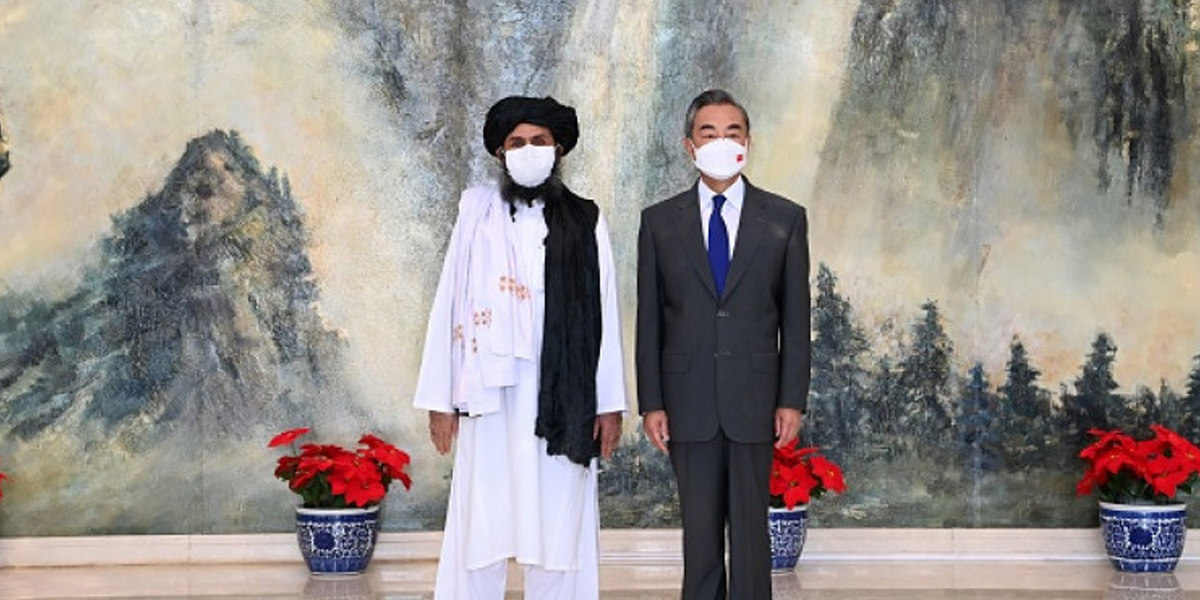Post-Taliban takeover, many have speculated on China’s stance towards Afghanistan and the Taliban. China remained involved in Afghanistan vis-a-vis trade, investment, and setting up mining and other industries. However, since the Taliban took over, China has not openly declared its Afghan policy. The much-anticipated declaration of the Chinese position on Afghanistan is finally out, urging the de facto authorities for prudent governance, safeguarding human rights, and underpinning the need for bilateral and multilateral cooperation in economy, trade, counter-terrorism, refugee crisis, etc.
On Wednesday, the Chinese embassy in Kabul issued a comprehensive statement depicting how it views and plans to deal with Afghanistan. According to the statement, first and foremost, China respects Afghanistan’s independence, sovereignty, and territorial integrity. It also respects the Afghan people’s right to make their own decisions and practice religion and customs.
China “never meddles in internal affairs of Afghanistan, never seeks its self-interest in Afghanistan, and never pursues so-called sphere of influence,” said the communique.
The statement further enlisted ten points:
● Supporting moderate and prudent governance in Afghanistan.
● Supporting peace and reconstruction of Afghanistan.
● Supporting Afghanistan in countering terrorism resolutely and forcefully.
● Calling for greater bilateral and multilateral counter-terrorism cooperation.
● Working together to fight terrorism, separatism, and extremism in Afghanistan.
● Urging the US to live up to its commitments and responsibilities to Afghanistan.
● Opposing external interference and infiltration in Afghanistan.
● Strengthening international and regional coordination on the Afghan issue.
● Facilitating solutions to Afghanistan’s humanitarian and refugee issues.
● Supporting Afghanistan’s fight against narcotics.
China hopes that Afghanistan would “build an open and inclusive political set-up, adopt moderate and prudent domestic and foreign policies, and engage in friendly exchanges with all countries, particularly neighboring countries.” It urged the interim Afghan government to stay committed to defending the fundamental rights and interests of all Afghans, “including women, children, and all ethnic groups.”
The statement also expressed concerns over the presence of the “East Turkestan Islamic Movement (ETIM)” saying that it poses a severe threat to the security of China, Afghanistan, and the region. It hoped that “Afghanistan will fulfill its commitment in earnest and take more effective measures to crack down on all terrorist forces.” To prevent the country from once again becoming a haven, breeding ground, and source of terrorism, China suggests that Afghanistan should be encouraged in adopting comprehensive measures to address both the symptoms and root causes of terrorism.
Criticizing the US, the statement also stated, “It is widely believed in the international community that the US, which initially caused the Afghan issue, is the biggest external factor that prevents meaningful improvement in the humanitarian situation in Afghanistan, by seizing Afghanistan’s overseas assets and imposing unilateral sanctions. The US should learn from what happened in Afghanistan, confront the serious humanitarian, economic, and security risks and challenges in Afghanistan, immediately lift its sanctions, return Afghan assets held abroad, and deliver its committed humanitarian aid to meet the urgent needs of the Afghan people.” The declaration underscored the regional countries’ perspective that the 20 years of foreign military intervention and “democratic transformation” in Afghanistan have resulted in “enormous losses and pain for Afghanistan.”
China also expects Afghanistan to serve as a platform for cooperation among diverse parties rather than geopolitical games “under the new circumstances.
To combat drug cultivation, production, and trafficking, it welcomes and supports Afghanistan in taking additional proactive measures. It will also collaborate with the international community to assist Afghanistan with alternative development and a crackdown on transnational drug-related crimes to eliminate the source of narcotics in the area. Additionally, it pledged to support the Afghan refugees through bilateral and multilateral means and “do its best” to support Afghanistan’s growth and reconstruction efforts and to advance steady advancement in economic, trade, and investment ties
The statement has unveiled China’s holistic and multilateral approach toward Afghanistan. Prioritizing a regional and cordial ambiance, it has once again proven itself a flag-bearer of people-centric and peace-centered diplomacy.
Under arrangement between Matrix and CRSS.

